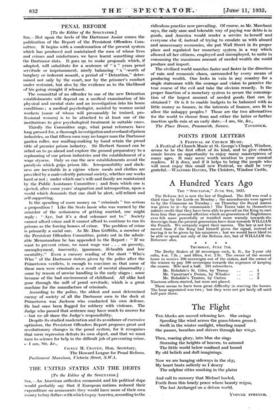'PENAL REFORM [To the Editor of the SPECTATOR.] Si,—Hot 'TOR
the heels of the Dartmoor Assize comes the publication of the Report of the Persistent Offenders Com- mittee. It begins with a condemnation of the present system which has produced and maintained the men of whose lives and crimes and misfortunes we have learnt something since the Dartmoor riots. It goes on to . make proposals which, if adopted, will substitute for a sentence of " x " years penal servitude or imprisonment, nicely balancing "x "-worth of burglary or indecent assault, a period of "Detention," deter- mined not only by the court, nor by the prisoner's conduct under restraint, but also by the evidence as to the likelihood of his going straight if released.
The committal of an offender to one of the new Detention establishments will depend on a medical examination of his physical and mental state and an investigation into his home conditions; a medical psychologist, assisted by women social workers (some of whom will presumably be trained, pro- fessional women) is to be attached to at least one of the institutions to give psychological treatment in suitable cases.
Thirdly the Committee urge, what penal reformers have long pressed for, a thorough investigation and overhaul of prison industries, so that fifteen men may no longer man the Dartmoor garden roller, nor mailbag-making by hand retain the proud title of premier prison industry. Sir Herbert Samuel can be relied on to go ahead and explore the ground preparatory to a replanning of our prison industries and the establishment of a wage styscm. Only so can the new establishments avoid the paralysis which grips prison life. Irresponsibility and slack- ness are inevitable in a rOgime where meals and clothes are provided by a malevolently paternal society, whether one works hard or not ; under which one's wife and family are maintained by the Public Assistance Committee ; and from which one is ejected, after some years' stagnation and introspection, upon a world which demands that one shall be alert, self-reliant and self-supporting.
Is the spending of more money on " criminals " too serious a proposition ? Like the Scots lassie who was warned by the minister of the seriousness of getting married, one might reply : "Aye, but it's a deal solemner not to." Society cannot afford crime and it cannot afford to continue to run its prisons as the forcing houses of crime. The problem of crime is primarily a social one. As Mr. Dan Griffiths, a member of the Persistent Offenders Committee, points out in the admir- able Memorandum he has appended to the Report : "If we want to prevent crime, we must wage war . . . on poverty, unemployment, insecurity, ignorance, ill-health and low mentality." Even a cursory reading of the short "Who's Who" of the Dartmoor rioters given by the police after the Princetown verdicts, is enough to convince us that some of these men were criminals as a result of mental abnormality ; some by reason of unwise handling in the early stages ; some because of the bad environment of childhood. All alike had gone through the mill of penal servitude, which is a great machine for the manufacture of criminals.
According to the police, the ablest and most determined enemy of society of all the Dartmoor men in the dock at Princetown was Jackson who conducted his own defence. I le had once been flogged for robbery with violence. The Judge who passed that sentence may have much to answer for —but we all share the Judge's responsibility.
Despite its studied moderation and its avoidance of excessive optimism, the Persistent Offenders Report proposes great and revolutionary changes in the penal system, for it recognizes that mere repression defeats its own object, and that we must turn to science for help in the difficult job of preventing crime. — I am, Sir, &c.,
CICELY M. CRAVEN, DOR. Secretary,


































 Previous page
Previous page